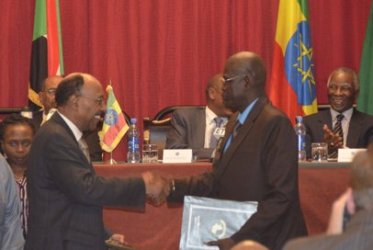Sudan admits existence of criticism to cooperation agreement, says SPLM-N are big problem
October 14, 2012 (KHARTOUM) — Sudan’s ruling National Congress Party has admitted the existence of a strong opposition on both sides to the cooperation agreement inked with South Sudan but underlined that the Sudanese rebels remain a big problem for Juba.

Also it was reported in Khartoum that the leadership of the rebel Sudan People’s Liberation Movement – North (SPLM-N) were summoned to a meeting held in Juba on Saturday and another meeting will take place for the Sudanese Revolutionary Front (SRF) rebels.
NCP spokesperson Badr Al-Din Ahmed Ibrahim said that Addis Ababa deals are facing criticism in South Sudan because of some influential officials who are directly concerned by some issues that are not yet resolved like Abyei and the SPLM-N.
“We are not concerned by what is going on in South Sudan but we admit that the agreement is facing criticism in the two countries,” he added.
He however ruled out that this rejection would affect its implementation as long as there is a political determination to enforce it from both sides and it benefits from the support of the United Nations.
He further said that even if there was a violation of the deal it would not mean the agreement would be cancelled.
He underscored that the security arrangements are the most important aspect for Khartoum, while for Juba needed to resume its oil exports.
Badr Al-Din said if any of the two parliaments does not ratify the agreement that force the agreement to be dropped.
In Khartoum the parliament has already started to examine the cooperation agreement anf in Juba President Salva Kiir will address the lawmakers on Monday before they discuss it.
Thabo Mbeki, African Union chief mediator has asked the SPLM-N rebels to resume talks with Khartoum over the issues of the Blue Nile and South Kordofan, known as the “Two Areas” in the 2005 peace agreement, Ashorooq TV reported on Sunday.
A member of the Sudanese negotiating team, Mohamed Koko said the cooperation agreement provides clearly that the two countries will not harbour rebel groups.
Commenting on the reports of a meeting between Salva Kiir and the SPLM-N leaders, Badr Al-Din said he expects that it was to explain to the rebels that the signed deal is definitive and they have to prepare themselves to become a political force rather than an armed force.
He further said that the SPLM-N “is one of biggest problems facing the South Sudan,” stressing that Kiir’s meeting with Malik Agar, Abdel Aziz AL-Hilu and Yasir Arman was intended to persuade them that there is no return to war with Sudan.
He added that Khartoum is sticking to the implementation of security arrangements signed in Addis Ababa pertaining to the disarmament of former members of the SPLA in Sudan.
He also renewed the rejection of his party to the initiative of President Salva Kiir to facilitate a deal with the SPLM-N pointing out that the government did not receive any official proposal in this regard.
“If (the proposal) is true, we will not accept it because the (SPLM-N) is part of the security arrangements” and “I cannot sign an agreement and before to implement it you come and open a new file. This means that you defeated the agreement (you signed) yourself,” he said.
He further said there was a (Sudanese) proposition to form the joint security committees before the ratification of the cooperation agreement by the parliaments of the two countries.
South Sudanese minister of information Barnaba Marial Benjamin explained Friday in statements to the Sudanese radio that the security meeting was delayed because Juba prefers that the parliament endorse the deal first.
(ST)
